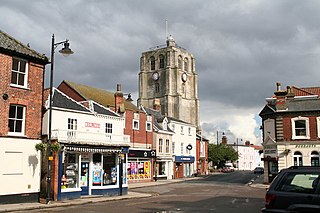
Beccles is a market town and civil parish in the English county of Suffolk. The town is 109 miles (175 km) from London via the A145 and A12 roads, 16 miles (26 km) south-east of Norwich and 33 miles (53 km) north-northeast of Ipswich. Nearby towns include Lowestoft to the east and Great Yarmouth to the north-east. The town lies on the River Waveney on the edge of The Broads National Park.
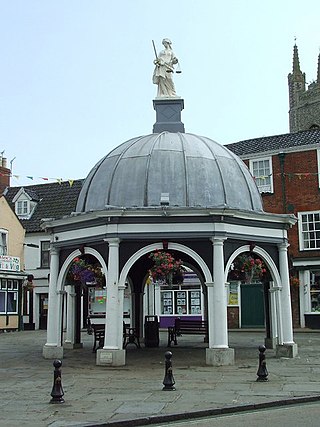
Bungay is a market town, civil parish and electoral ward in the English county of Suffolk. It lies in the Waveney Valley, 5+1⁄2 miles west of Beccles on the edge of The Broads, and at the neck of a meander of the River Waveney.

Horning is an ancient village and parish in the English county of Norfolk. It covers an area of 11 km2 and had a population of 1,033 in the 2001 census. Horning parish lies on the northern bank of the River Bure south of the River Thurne and is located in The Broads National Park. For the purposes of local government, it falls within the district of North Norfolk, although areas alongside the rivers and broads fall into the executive area of the Broads Authority.
This article describes the history of Suffolk, the English county.

George James Cholmondeley, 1st Marquess of Cholmondeley,, styled Viscount Malpas between 1764 and 1770 and known as The Earl of Cholmondeley between 1770 and 1815, was a British peer and politician.

Barsham is a village and civil parish in the East Suffolk district of the English county of Suffolk. It is about 2 miles (3.2 km) west of Beccles, south of the River Waveney on the edge of The Broads National Park. It is spread either side of the B1062 Beccles to Bungay road.

Edward Enda Haughey, Baron Ballyedmond, OBE, FRCVS, was an Irish-British entrepreneur and politician.

Ellingham is a village and civil parish in the English county of Norfolk. The village is located 2.3 miles (3.7 km) north-east of Bungay and 13 miles (21 km) south-east of Norwich, along the River Waveney. The majority of the population lies in the east of the parish in Kirby Row.
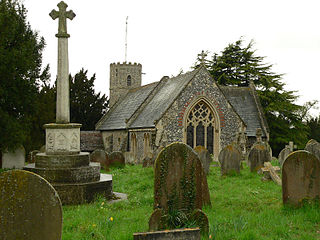
Geldeston is a village and civil parish in the English county of Norfolk. The village is located 2.5 miles (4.0 km) north-west of Beccles and 14 miles (23 km) south-east of Norwich, on the north bank of the River Waveney.

Minster Lovell is a village and civil parish on the River Windrush about 2+1⁄2 miles (4 km) west of Witney in Oxfordshire. The 2011 Census recorded the parish's population as 1,409. Minster Lovell village has three parts: Old Minster, Little Minster and New Minster. Old Minster includes the parish church, Minster Lovell Hall and the Old Swan Inn and Minster Mill Hotel. A large part of New Minster is the Charterville Allotments, which were founded by the Chartists in 1846–50.
Lieutenant-General Lord George Thomas de la Poer Beresford, was an Anglo-Irish soldier, courtier and politician. He served as Comptroller of the Household from 1812 to 1830.

William Henry Hugh Cholmondeley, 3rd Marquess of Cholmondeley, styled Lord Henry Cholmondeley from 1815 until 1870, was a British peer and Conservative Member of Parliament.
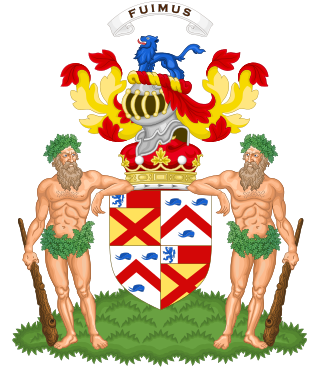
Henry Augustus Brudenell-Bruce, 5th Marquess of Ailesbury, styled Lord Henry Bruce from 1878 to 1894, was a British soldier, businessman and Conservative politician.
Admiral Sir John Beresford, 1st Baronet, was a Royal Navy admiral, Second Sea Lord and Conservative MP.
Sir Edmund Bacon, 5th Baronet, of Gillingham, Norfolk, was a British Whig politician who sat in the House of Commons from 1722 to 1738.
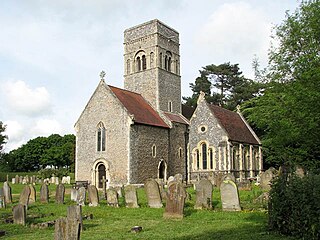
Gillingham is a small village and civil parish in the English county of Norfolk. The villages is located 1.5 miles (2.4 km) north-west of Beccles and 15 miles (24 km) south-east of Norwich, along the A146 between Norwich and Lowestoft.

Elizabeth Hay, Countess of Erroll was an illegitimate daughter of King William IV of the United Kingdom and Dorothea Jordan. She married William Hay, 18th Earl of Erroll, and became Countess of Erroll on 4 December 1820 at age 19. Due to Hay's parentage, William Hay became Lord Steward of the Household. Elizabeth and William Hay married at St George's, Hanover Square. Hay is pictured in a FitzClarence family portrait in House of Dun, and kept a stone thrown at her father William IV and the gloves he wore on opening his first Parliament as mementos.
Admiral Henry Eden was a senior British Royal Navy officer who went on to be Second Naval Lord.

On 13 March 2014, an AgustaWestland AW139 helicopter of Haughey Air crashed shortly after taking off at night in fog from Gillingham, Norfolk, United Kingdom, killing all four people on board. Among the victims was Edward Haughey, Baron Ballyedmond.
Sir William Mordaunt Edward Milner, 5th Baronet was a Whig politician.














